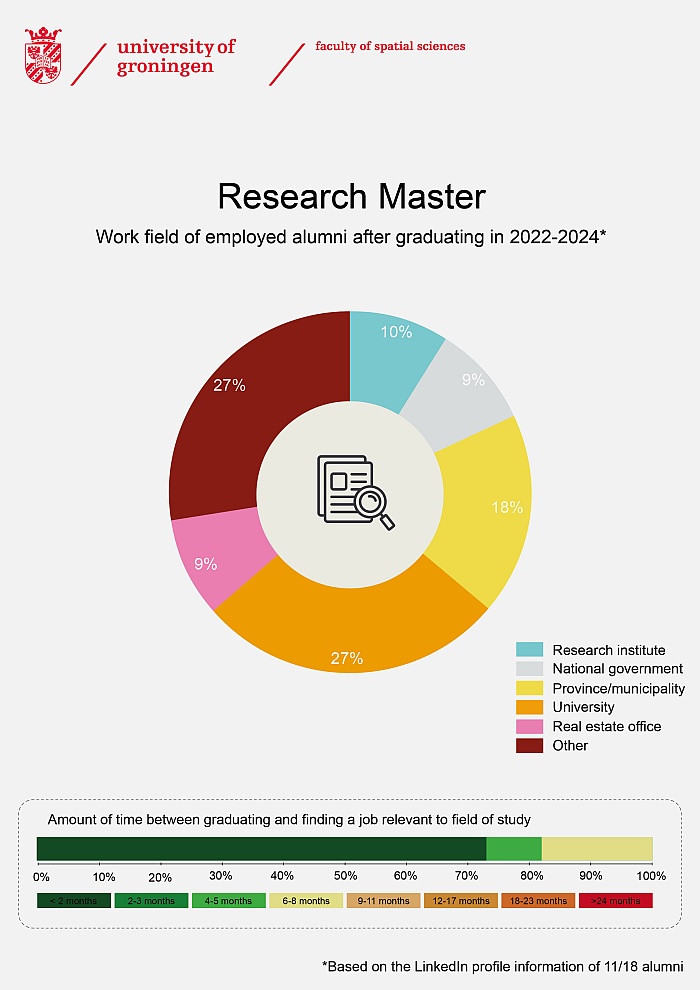Courses master Spatial Sciences (Research)
Do you want to become a skilled researcher in economic and cultural geography, planning and demography? The master Spatial Sciences is interdisciplinary. It studies the fields of demography, human geography and spatial planning from a social and economic science perspective. The two-year programme provides ample opportunity for you to focus on the themes that interest you.
What will you learn?
The programme of the master Spatial Sciences (Research) consists of the following courses. Click on the course title to go to the full course description, information about lecturers, literature and time period. This is a two-year programme.
You can also do a Research Master Specialization. You can enroll in the Research Master and then specialize in one of our other master programmes.
Year 1
Thematic Theoretical Specialization (TTS) (20EC)
You should be involved in acquiring a rich and diverse set of knowledge and competencies regarding regional studies. The theoretical and thematic specialization is the portfolio of modules focused on theory and contents that you are required to fulfil during your research master in Spatial Sciences. Students can take modules at the Faculty of Behavioural and Social Sciences, the Faculty of Philosophy, and also at Utrecht University, Wageningen University and the University of Amsterdam in the past. You can do 15EC instead of 20EC. You will then do an extra 5 EC of the Research Internship. See our course catalog Ocasys for modules you can take within the faculty. This course also takes place in the second year (10EC).
Advanced and Specialized Research Methods (A&SRM) (10EC)
The aim of this course is to learn advanced and specialized research methods and techniques relevant for research in human geography, demography and spatial planning. You can take different modules within and outside the faculty, ranging from fieldwork to advances statistical analysis. This course consists of modules worth a total of 15 ECTS focus on advanced and specialized research methods and techniques, which are relevant for research in human geography, demography, and spatial planning. Students can choose 15 EC from a list of courses that range from fieldwork to advanced statistical analysis. In the first year, you take 10EC worth of modules and the second year 5EC.
Joint Multidisciplinary Research Project (JMRP) (5EC)
In the Joint Multidisciplinary Project, student team from different disciplinary backgrounds within the Spatial Sciences work together to tackle research problems that local and regional governments, firms or organisations have identified. The teams work on well-defined assignments that challenge students to apply their knowledge and skills in real-world settings. The end result of the project is a report that is presented to the client at the end of the semester.
Individual Research Training (IRT) (10EC)
The Individual Research training (IRT) module is focused on facilitating your awareness of the process of doing research, its methods and the reporting of research outcomes. You will do active research (or research activities), while being supervised by a URSI/Nether researcher in the Faculty of Spatial Sciences. The students can choose an IRT project from a list of projects offered by URSI/Nethur researchers or propose a project themselves. The outcome of the IRT is a scientific end product e.g. research article, conference paper, essay or scientific report.
Research Internship (10EC)
One of the key objectives of the Research Master Degree in Spatial Sciences is to train students to be good researcher in different settings at an international level. This module is an important part of the degree programme, in which students conduct research in another institutional setting: that of a renowned professional research institute. One can think of the OECD, the FAO, the World Bank etc. or in the Dutch context Planbureau voor de Leefomgeving (PBL), NIDI etc. t is possible to extend the course Research Internship to 15EC, and skip 5EC from Thematic Theoretical Specilization.
Scientific Reading, Debating, Reflecting (5EC)
The course Scientific Reading, Debating and Reflection has as its purpose to fuel scientific curiosity and to create a stimulating atmosphere of academic freedom with room for everyday scientific observations as well as deep-digging questions. In the course students read, discuss, write and present about famous scientifically inspiring books, documentaries, and articles; also relating to the philosophy of science. Furthermore, all students keep a personal scientific diary to track and develop their scientific expertise, discoveries, problems, observations, and thoughts throughout the year.
Year 2
Thematic Theoretical Specialization (TTS) (5EC)
You should be involved in acquiring a rich and diverse set of knowledge and competencies regarding regional studies. The theoretical and thematic specialization is the portfolio of courses focused on theory and contents that you are required to fulfil during your research master in regional studies. You can take different modules within and outside the faculty. See our course catalog Ocasys for modules you can take within the faculty.
Advanced and Specialized Research Methods (A&SRM) (5EC)
Apply advanced and specialized research methods and techniques relevant for research in the spatial sciences. You can take different modules within and outside the faculty, ranging from fieldwork to advances statistical analysis. This course consists of modules worth a total of 15 ECTS focus on advanced and specialized research methods and techniques, which are relevant for research in human geography, demography, and spatial planning. Students can choose 15 EC from a list of courses that range from fieldwork to advanced statistical analysis. It is complemented with the obligatory final 5EC course 'Advanced Research Skills' to make up 20 EC of methodological training.
Advanced Research Skills (5EC)
The course runs on two tracks. The first track trains a multitude of high-level cutting-edge research methods, research software and data use in a practical way. Different PhD students will largely give this part of the course, basically one PhD for every week. Every week then, a PhD student gives a start and end workshop introducing in a hands-on way an interesting research method, a piece of software, a nice dataset etc. In the second track of the course, the students write a paper which can be seen as a synthesis of all their (20EC) research methods courses.
Conceptualising Spatial Science Research (5 EC)
In the course, students learn to go through the research process, i.e. from addressing ontological and epistemological questions, situating oneself in a paradigm, to formulation of objective and research questions, to the application of theory and conceptual models, to the definition of concepts, and selection of an appropriate study design.
Individual Master’s Thesis (30EC)
The Individual Master’s thesis is the final product of the program, including and reflecting all that has been learned in the programme. The topic should be embedded in the Faculty Research Program towards Wellbeing, Innovation and Spatial Transformation (tWIST).
Scientific Reading, Debating, Reflecting (5EC)
The course Scientific Reading, Debating and Reflection has as its purpose to fuel scientific curiosity and to create a stimulating atmosphere of academic freedom with room for everyday scientific observations as well as deep-digging questions. In the course students read, discuss, write and present about famous scientifically inspiring books, documentaries, and articles; also relating to the philosophy of science. Furthermore, all students keep a personal scientific diary to track and develop their scientific expertise, discoveries, problems, observations, and thoughts throughout the year.




